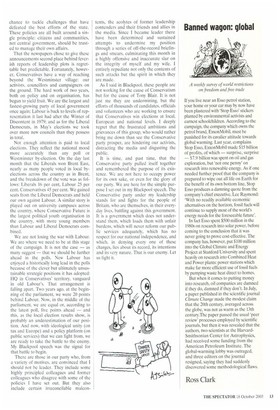Banned wagon: global
A weekly survey of world restrictions on freedom and free trade
If you live near an Esso petrol station, your home or your car may by now have been plastered with 'Stop Esso' stickers planted by environmental activists and earnest schoolchildren. According to the campaign, the company which owns the petrol brand, ExxonMobil, must be punished for its cavalier attitude towards global warming. Last year, complains Stop Esso, DownMobil made $15 billion of profits, of which — surprise, surprise — $7.9 billion was spent on oil and gas exploration, but 'not one penny' on research into renewable energy. As if one needed further proof that the company is prepared to wipe out all life on Earth for the benefit of its own bottom line, Stop Esso produces a damning quote from the company's chief executive, Lee Raymond: 'With no readily available economic alternatives on the horizon, fossil fuels will continue to supply most of the world's energy needs for the foreseeable future'.
In fact Esso spent $500 million in the 1980s on research into solar power, before coming to the conclusion that it was never going to prove cost-effective. The company has, however, put $100 million into the Global Climate and Energy Project at Stanford University and spent heavily on research into Combined Heat and Power plants: power stations which make far more efficient use of fossil fuels by pumping waste heat direct to homes.
But when it comes to putting money into research, oil companies are damned if they do, damned if they don't. In July, a paper published in the scientific journal Climate Change made the modest claim that the 20th century, averaged across the globe, was not as warm as the 13th century.The paper passed the usual 'peer review' processes employed by scientific journals, but then it was revealed that the authors, two scientists at the HarvardSmithsonian Center for Astrophysics, had received some funding from the American Petroleum Institute. The global-warming lobby was outraged, and three editors on the journal resigned, saying they had suddenly discovered some methodological flaws,
Ross Clark


































































































 Previous page
Previous page